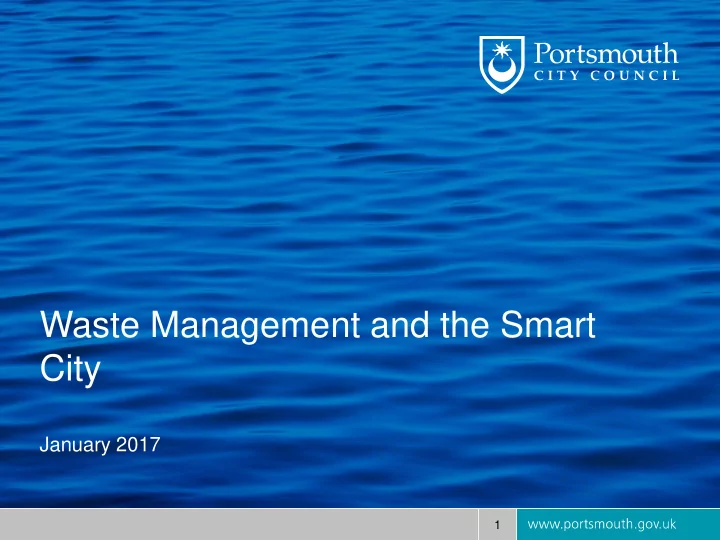

Waste Management and the Smart City January 2017 1
So what is a smart city? The intelligent and integrated use of technology and information to help cities function more efficiently and create a better quality of life for its citizens SC’s aim to be centred on the citizen - giving them the opportunity to engage and have more of a say in the services provided to them by the public sector A citizen may want to know how much waste they produce and what happens to that waste. 2
Waste Management Managing waste effectively is extremely important for a number of reasons: public health the environment managing volumes and costs promoting sustainability 3
Background to waste in Portsmouth In Portsmouth (annually) we produce: Kerbside Refuse 48169.85 Glass 1910.44 Dry Mixed Recyclables (DMR) 8766.3 Textiles 281.03 Garden Waste 1233.08 HWRC Amenity Refuse 3653.92 Soil/Rubble 2803.12 Wood 2618.58 Plasterboard 158.67 Garden Waste 2345.11 We currently work as part of a Hampshire wide partnership Project Integra (PI) and use the Energy Recovery Facility (ERF) and Mixed Recyclables Facility (MRF) at Dundas Lane 4
What smart technology is used in the waste industry? Public smart bins RFID tagging/fill sensors GPS Route optimisation Call management PDAs Less so - on board weighing, tagged bins 5
So what could we do? At Household level - RFID bin tagging technology exists (though not widely used yet in the UK) Could lead to 'pay as you throw' Route level - could be shared by collection route HWRC - breakdown by type of waste Waste data flow quite complex - but we could show it by waste type…is on www.wastedataflow.org.uk 6
Who might make use of the data? Residents - book bulky collection, find nearest recycling facilities, info about what they can recycle How their neighbourhood is performing Government - National recycling statistics to hold LA’s to account City Waste managers - need to understand how their collection systems are performing (or not) and bring forward efficiency measures. 7
So what are we doing in Portsmouth and what more can we do… Weight of waste - we collect weight of waste and recycling by round which can identify a specified area - we are beginning to look at this in order to understand where we can target resources to reduce waste and increase recycling – also to see if what we do is making any difference 8
Tonnage data – by round 9
So what are we doing in Portsmouth and what more can we do…(cont.d) Record where the waste comes from - we do this by round and we also breakdown other waste types by fly tip/fridge freezers/green waste/TVs etc. Improving our analysis of data and acting on it Consistent reporting format from contractor eg red hangers (PDA use) Developing a systems approach – the waste management team and Biffa are working to ‘enable recycling and remove waste on the collection day’ We are looking into areas where ‘fill sensors’ might be used and whether there are savings in collection possible 10
Any questions? 11
Recommend
More recommend